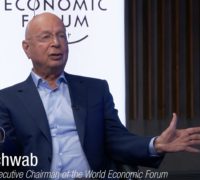New generation of shareholders
Schwab sees a new generation of shareholders as driving the move towards stakeholder capitalism. For example, tiny activist hedge fund Engine No. 1 booted out three board directors at Exxon Mobil Corp earlier this year in a bid to get the oil major to develop a plan to address climate change.
“I am very confident that victory will be declared in the long term for stakeholder capitalism,” he says.
But for this to happen, society will have to learn to work together again, says Schwab. “We have become more egocentric; cooperation in an egocentric world is more difficult.”
Schwab says he believes it is now more important than ever to include disenfranchised voices when trying to solve the complex challenges facing the world, such as the climate emergency, by creating co-ownership and ensuring support from the start.
During the early days of the WEF, Schwab who was born in Ravensburg, Germany and trained as a mechanical engineer, sat on the boards of several German companies and became familiar with the notion of co-determination, which allows workers to elect trade union representatives to supervisory boards. While this might lead to more resistance and slow down decision-making, it means you have more support in the long run, he says.
Another challenge is to persuade citizens that short-term sacrifices are needed for the long-term benefit of society, as is the case if the world is going to achieve the goal of limiting global warming to between 1.5 and 2 degrees Celsius to stave off the most catastrophic consequences of climate change. “The problem is that sacrifices are not equally distributed and the benefit is not equally distributed,” he says.
As well as combatting the climate emergency, Schwab sees the need for stakeholder capitalism to help address urgent skills gaps and inequality in a rapidly changing world where new technologies like Artificial Intelligence, cryptocurrencies and quantum computing are transforming society.
To future-proof the workforce, business needs to take the lead by providing hands-on training in digital skills. The WEF has also launched the Reskilling Revolution project which aims to provide one billion people with new skills that fit with the Fourth Industrial Revolution.
Asked about succession, Schwab, 83, says he still feels mentally and physically capable of carrying out his role as executive chairman at the WEF. He keeps fit by swimming for 40 minutes every morning and stays mentally agile by reading up on his interests and trying to concentrate on the positive side of life.
While traditionally, successors were groomed over many years and appointed based on their experience, Schwab believes the criteria for the next generation of leaders have changed.
“Today experience is less important; what is much more important is that you are in line with the times, you are forward-orientated, you are a fast learner.”
YouTube


